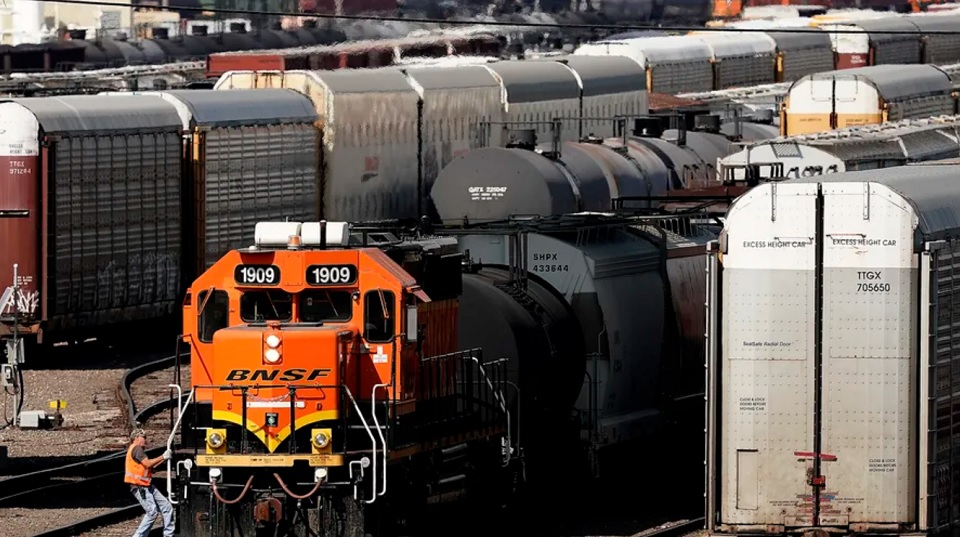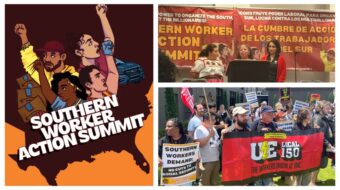
CLEVELAND—Members of the two largest unions of freight rail workers, the Brotherhood of Locomotive Engineers & Trainmen/Teamsters and the Smart-Transportation Division, have split on ratifying a proposed new five-year contract with the nation’s big Class I freight railroads.
Rail bosses yowled about the decisions and said they’d take their case to Congress, to get lawmakers to impose a settlement—conveniently overlooking that their own staff cuts since 2014 and debilitating work rules combined to lead to the rejections in the first place.
Some two-thirds of eligible BLE&T members voted, favoring the pact by a 54%-46% margin, the union said. The union represents 24,000 engineers and trainmen.
Meanwhile, 50.87% of train and engine service members—rail operating crafts—represented by Smart-TD voted against the tentative pact, and 62.48% of Smart-TD-represented yardmasters voted to ratify. The 1,300 yardmasters, a non-operating craft, are part of Smart-TD’s overall 28,000 rail workers.
Together, Smart-TD and the Locomotive Engineers & Trainmen represent almost half of all 115,000 unionized workers at the nation’s big freight railroads, including CSX, the Union Pacific, the Burlington Northern Santa Fe and the Kansas City Southern.
Key issues in the rejection are working conditions, even more than wages, for the operating crafts. Those working conditions include two-weeks-straight stretches with no days off, forced callbacks even on days off when short-staffing hits, and no paid sick leave—not even for doctors’ appointments.
And rail workers who refuse the forced callbacks, or who showed up late are docked “points” from their work record. Too many negative points lead to arbitrary firings.
“Smart-TD members with their votes have spoken, and it’s now back to the bargaining table for our operating craft members,” Smart-TD President Jeremy Ferguson said in a statement. “This can all be settled through negotiations and without a strike. A settlement would be in the best interests of the workers, the railroads, shippers and the American people.
“The ball is now in the railroads’ court. Let’s see what they do. They can settle this at the table. But railroad executives who constantly complain about government interference and regularly bad-mouth regulators and Congress now want Congress to do the bargaining for them.”
Railroad Workers United, an organization of rank-and-file workers from all crafts and all railroads—large and small—campaigned against the pact as “concessionary” to the railroads, and called mass meetings of its members via zoom to prepare them for being forced to strike.
The proposed pact, modeled on a deal a presidential board recommended, called for a cumulative 24% raise over five years. The workers haven’t had a regular raise, except cost-of-living increases mandated by their prior pact, since 2019, when it expired.
The presidential board did little about the working conditions. Neither did the proposed contract. One small craft which rejected the board’s pact got a little more paid sick leave, and then ratified its own pact with the bosses.
The decisions mean Smart-TD and three smaller unions which also rejected the contract will return to the bargaining with the bosses, represented by the National Carriers Conference Committee.
If the two sides can’t reach an acceptable deal by the end of the latest mandated “cooling-off” period on Dec. 9, the 1925 Railway Labor Act leaves the unions free to strike and the bosses free to lock them out, or—as they now say in their statement—go to Congress to impose a contract. In their statement, the rail bosses did not say whether they would lock out the workers when the cooling off period ends.
The bosses were also silent about the working conditions. Instead, they tried to cloak themselves as being pro-consumer, talking about delayed shipments of goods. They didn’t mention their record $146 billion in cumulative profits since they began Wall Street-mandated cost- and job-cutting eight years ago.
If the railroads force any workers whose unions rejected the pact to strike, all 13 rail unions pledged to honor picket lines, BLE&T President Dennis Pierce said.
“We stood shoulder to shoulder with our brothers and sisters in SMART-TD and others in rail labor throughout this process, and we will continue to stand in solidarity with them as we approach the finish line in this round of negotiations,” he stated.










